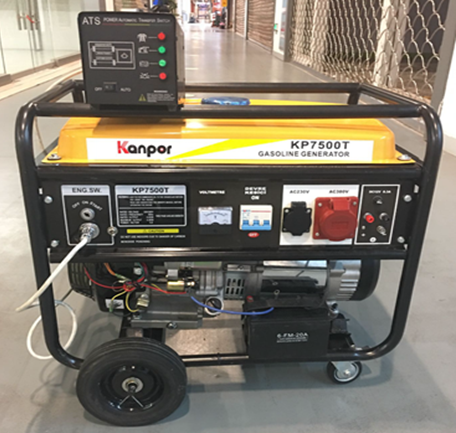The Ultimate Guide to Water Cooled Generators: Everything You Need to Know About Price and Performance
In today’s world, where technology and efficiency go hand-in-hand, the quest for optimal power solutions is ever-present. Among the various options available, water cooled generators stand out as a powerful and efficient choice for many applications. But, as with any significant investment, understanding their pricing and functionality is crucial. In this blog, we’ll dive deep into the fascinating world of water cooled generators, exploring what they are, their benefits, and what you can expect in terms of pricing. Let’s embark on this journey to discover how these marvels of engineering can be a game-changer for you!
What is a Water Cooled Generator?
At its core, a generator is a machine that converts mechanical energy into electrical energy. This process generates a lot of heat, which needs to be managed effectively to ensure optimal performance and longevity. A water cooled generator uses a water-based system to dissipate this heat. Unlike air cooled generators, which use air to remove heat, water cooled generators use water as a coolant, making them more efficient in handling larger amounts of heat.
How Do Water Cooled Generators Work?
The operation of a water cooled generator is fairly straightforward. Inside the generator, the engine generates electricity and simultaneously produces heat. This heat is transferred to a water jacket—a part of the engine that surrounds the combustion chamber. Water is then circulated through this jacket, absorbing the heat. The heated water is transported to a heat exchanger where it releases the heat to the atmosphere. This process keeps the engine operating at an optimal temperature, ensuring both efficiency and longevity.
Advantages of Water Cooled Generators
Increased Efficiency: One of the primary benefits of water cooled generators is their superior efficiency. By keeping the engine at a stable temperature, these generators can operate at higher performance levels compared to air cooled counterparts. This can be particularly advantageous in industrial settings where constant, reliable power is crucial.
Reduced Noise Levels: Water cooled generators tend to be quieter than air cooled generators. The water system helps to muffle the noise produced by the engine, making them ideal for environments where noise reduction is important, such as in residential areas or offices.
Better Performance in High Temperatures: In regions with high ambient temperatures, air cooled generators can struggle to maintain optimal operating temperatures. Water cooled generators, on the other hand, are less affected by external temperature fluctuations, making them more reliable in extreme conditions.
Compact Design: Since water cooled generators can be more efficient at dissipating heat, they often require less space for cooling mechanisms. This can result in a more compact design, which is beneficial for installations where space is a premium.

Factors Affecting Water Cooled Generator Price
When considering the purchase of a water cooled generator, the price is a significant factor. Understanding what influences the cost can help you make a more informed decision. Here are some key factors that can affect the price of water cooled generators:
Generator Size and Capacity: Larger generators with higher capacity generally cost more. The price increases with the size of the generator, which is a reflection of the increased complexity and materials required for higher output.
Brand and Manufacturer: The brand and manufacturer play a crucial role in the pricing of water cooled generators. Established brands with a reputation for quality and reliability often command higher prices. Investing in a reputable brand can offer better performance and support, but it might come at a premium.
Features and Specifications: Water cooled generators come with various features such as automatic start, fuel efficiency, and advanced control systems. Generators with more advanced features and specifications tend to be priced higher.
Installation and Maintenance Costs: Beyond the initial purchase price, you should consider the costs of installation and maintenance. Water cooled generators often require professional installation and regular maintenance, which can add to the overall cost.
Market Demand and Supply: The price of water cooled generators can also be influenced by market demand and supply. During periods of high demand or low supply, prices may increase.
What Can You Expect in Terms of Pricing?
The price of water cooled generators can vary widely depending on the factors mentioned above. On average, you might expect to pay anywhere from $5,000 to $50,000 or more for a water cooled generator. Smaller, lower-capacity models will be on the lower end of the spectrum, while larger, high-capacity models with advanced features will be at the higher end.
For example, a small, residential water cooled generator with a capacity of around 10 kW might cost between $5,000 and $10,000. On the other hand, a large industrial water cooled generator with a capacity of 200 kW or more could easily exceed $50,000. It’s important to assess your needs and budget to find a generator that offers the best balance of price and performance for your specific application.
Tips for Buying a Water Cooled Generator
Assess Your Power Needs: Before purchasing a generator, evaluate your power requirements. This will help you determine the appropriate size and capacity for your needs, ensuring you don’t overpay for unnecessary power.
Research Brands and Models: Take the time to research different brands and models. Look for reviews and ratings to gauge the reliability and performance of various generators.
Get Multiple Quotes: Obtain quotes from multiple suppliers to compare prices and features. This will give you a better understanding of the market and help you make an informed decision.
Consider Total Cost of Ownership: Remember to factor in the costs of installation, maintenance, and fuel when budgeting for a water cooled generator. The initial purchase price is just one part of the overall cost.
Consult with Experts: If you’re unsure about which generator is right for you, consult with a professional. They can provide valuable insights and recommendations based on your specific requirements.
Conclusion
Water cooled generators offer a host of benefits, including increased efficiency, reduced noise, and reliable performance in various conditions. Understanding the factors that influence their price can help you make a more informed decision when purchasing one. By considering your power needs, researching different options, and consulting with experts, you can find the perfect water cooled generator to meet your requirements and budget.
Investing in a water cooled generator is not just about buying a piece of machinery; it’s about securing a reliable power source that will serve you efficiently for years to come. Whether you’re powering a home, an office, or an industrial facility, a well-chosen water cooled generator can be a valuable asset, providing peace of mind and dependable performance.


